Maggi nutrition information is crucial for understanding the health benefits and ingredients of this popular food brand. Whether you’re a fan of their noodles or other products, knowing what goes into your meals is essential for making informed choices about your diet.
Key Takeaways:
- Each serving of Maggi noodles contains 389 calories, 13.5g of fat, 59.6g of carbohydrates, and 8.2g of protein.
- Maggi is actively working on improving the nutritional value of their products by reducing salt and focusing on natural ingredients.
- They encourage the use of fresh ingredients in their recipes, which can enhance the overall nutritional content of your meals.
- Maggi is committed to promoting sustainability in their value chain, ensuring their products have a positive impact on the environment.
- Understanding Maggi’s nutritional facts and food label information allows you to make informed choices about your dietary intake.
With Maggi nutrition information at your fingertips, you can enjoy their tasty products while prioritizing your health and well-being. Let’s delve into the details and explore the nutritional composition, ingredients, and more.
Understanding Maggi’s Nutritional Composition
To make informed food choices, it’s important to understand the key components of Maggi noodles’ nutritional profile. Let’s take a closer look at the nutritional composition of Maggi noodles, including the calorie count, macronutrients, and essential nutrients.
For every 100g serving of Maggi noodles, you can expect to consume approximately 389 calories. This makes it an energy-dense food choice. The noodles also contain 13.5g of fat, which accounts for about 31% of the total calorie content. It’s worth noting that not all fats are created equal, and Maggi aims to reduce the saturated fat content in their products.
When it comes to carbohydrates, Maggi noodles provide 59.6g per serving, making up about 61% of the total calorie content. Carbs are an essential energy source for the body, but it’s important to be mindful of portion sizes and balance them with other nutrients. Additionally, Maggi noodles offer 8.2g of protein, which accounts for about 8% of the total calorie content. Protein is crucial for supporting muscle growth and repair.
| Nutrient | Amount per 100g |
|---|---|
| Calories | 389 |
| Fat | 13.5g |
| Carbohydrates | 59.6g |
| Protein | 8.2g |
| Sugar | 2.2g |
| Fiber | 3.6g |
| Sodium | 1028mg |
| Potassium | 365mg |
Maggi is committed to enhancing the nutritional value of their products. They are actively reducing the sodium content, which is currently at 1028mg per serving. High sodium intake can have implications for blood pressure, so this reduction aligns with promoting healthier food choices. Additionally, Maggi aims to use more natural ingredients and encourages consumers to include fresh ingredients when preparing their Maggi noodle dishes. By doing so, they are providing options for individuals to customize their meals and make them more nutritious.
As we move forward, Maggi continues to focus on improving their nutritional facts to cater to the evolving needs of health-conscious consumers. They are dedicated to transparency and providing reliable nutrition information, enabling consumers to make informed choices about their dietary intake. By understanding the nutritional composition of Maggi noodles and incorporating fresh ingredients, you can enjoy a balanced and satisfying meal.
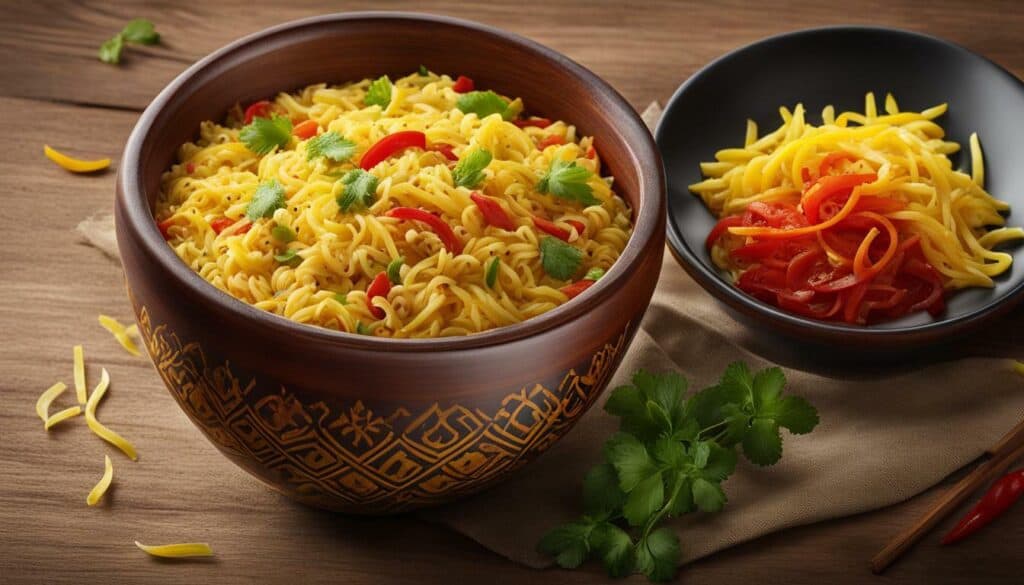
Let’s take a closer look at the calorie breakdown of Maggi noodles to understand its impact on your daily energy intake. Maggi noodles are a popular instant noodle brand known for their quick and convenient preparation. However, it’s essential to be aware of the nutritional content, especially the calorie count, to make informed choices about your diet.
For every 100 grams of Maggi noodles, you can expect approximately 389 calories. This means that if you consume a standard serving size of Maggi noodles, you will be taking in a significant amount of energy. It’s important to consider this when planning your overall calorie intake for the day.
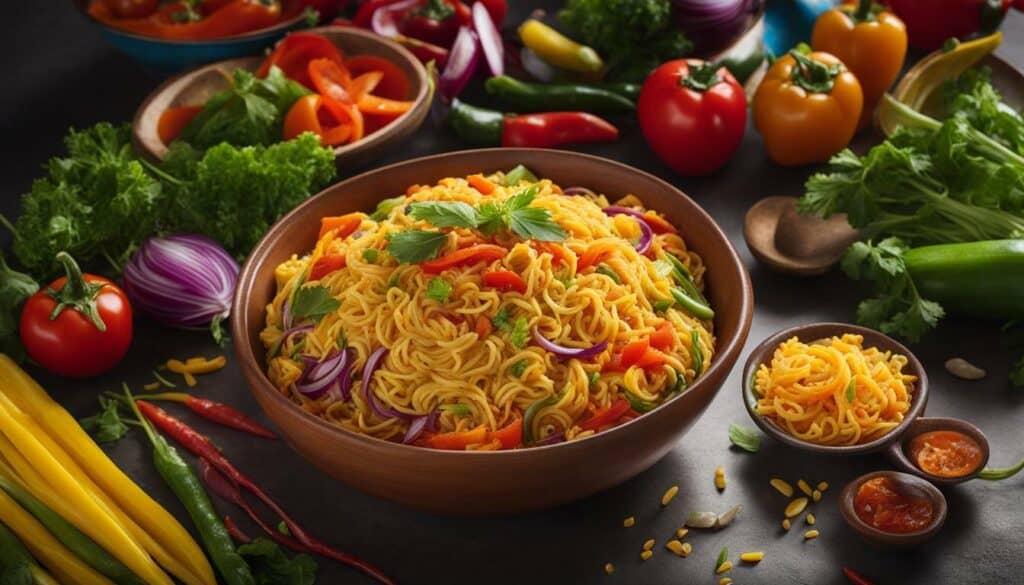
In terms of macronutrients, Maggi noodles contain 13.5 grams of fat, 59.6 grams of carbohydrates, and 8.2 grams of protein per 100 grams. These macronutrients play a vital role in providing energy and supporting various bodily functions. However, it’s crucial to maintain a balanced diet and not solely rely on Maggi noodles as a significant source of nutrition.
It’s interesting to note that Maggi noodles have a calorie breakdown of 31% from fat, 61% from carbohydrates, and 8% from protein. This composition can vary slightly depending on the flavor and type of Maggi noodles you choose. These percentages can help you understand the primary sources of energy in Maggi noodles and adjust your dietary choices accordingly.
Maggi Noodles Calorie Breakdown
| Nutrient | Amount per 100g |
|---|---|
| Calories | 389 |
| Fat | 13.5g |
| Carbohydrates | 59.6g |
| Protein | 8.2g |
| Sugar | 2.2g |
| Fiber | 3.6g |
| Sodium | 1028mg |
| Potassium | 365mg |
Understanding the calorie breakdown of Maggi noodles empowers you to make conscious decisions about your dietary choices. It’s important to remember that moderation and incorporating a variety of nutritious foods into your diet are key to maintaining a healthy lifestyle.
Essential Nutrients in Maggi Noodles
Discover the key nutrients that make Maggi noodles a satisfying and potentially nutritious meal option. Despite their reputation as a quick and convenient snack, Maggi noodles contain a range of essential nutrients that contribute to a balanced diet. Let’s take a closer look at the nutritional composition of Maggi noodles.
When it comes to macronutrients, Maggi noodles provide a moderate amount of fat, carbohydrates, and protein. In a 100g serving, you’ll find approximately 13.5g of fat, 59.6g of carbohydrates, and 8.2g of protein. While the fat content may seem high, it’s important to consider that some fats are necessary for our bodies to function properly.
Aside from macronutrients, Maggi noodles also contain essential micronutrients. These include fiber, sodium, potassium, and various vitamins and minerals. Fiber is essential for maintaining a healthy digestive system, and a serving of Maggi noodles provides around 3.6g of fiber. Additionally, Maggi noodles are a source of sodium and potassium, which play important roles in regulating fluid balance and supporting nerve and muscle function.
To put it into perspective, here’s a breakdown of the nutritional values for 100g of Maggi noodles: 389 calories, 13.5g of fat, 59.6g of carbohydrates, 8.2g of protein, 2.2g of sugar, 3.6g of fiber, 1028mg of sodium, and 365mg of potassium. The calorie breakdown is approximately 31% fat, 61% carbs, and 8% protein.
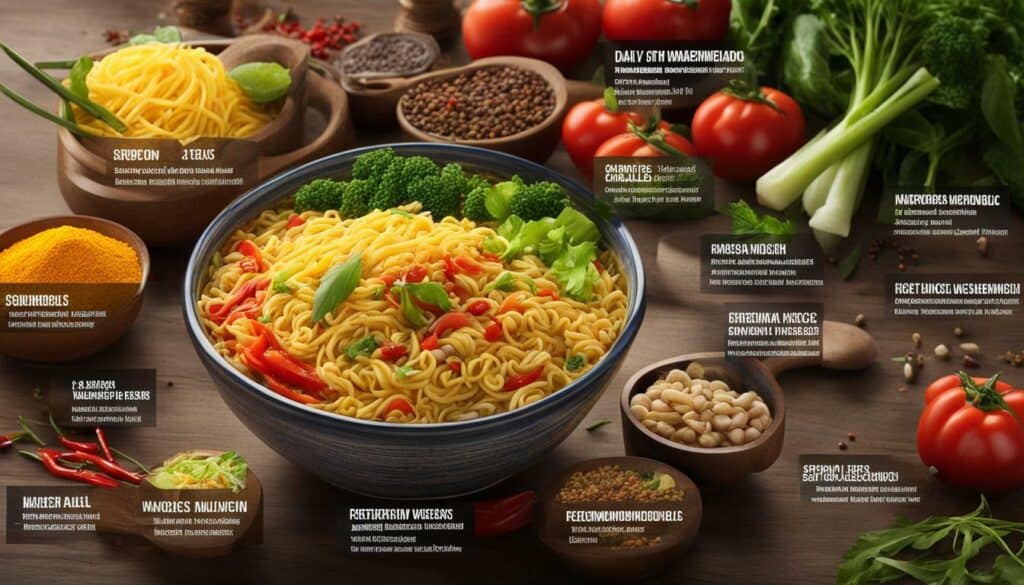
As part of their commitment to promoting healthier choices, Maggi is actively working on improving the nutritional value of their products. They aim to reduce salt content and focus on using natural ingredients. In addition, Maggi encourages consumers to incorporate fresh ingredients into their Maggi noodle recipes, enhancing the nutritional profile and taste. By doing so, you can enjoy the convenience of Maggi noodles while also maintaining a balanced lifestyle.
Summary:
- Maggi noodles contain essential macronutrients such as fat, carbohydrates, and protein.
- They also provide essential micronutrients including fiber, sodium, potassium, and various vitamins and minerals.
- A 100g serving of Maggi noodles contains 389 calories, 13.5g of fat, 59.6g of carbohydrates, 8.2g of protein, 2.2g of sugar, 3.6g of fiber, 1028mg of sodium, and 365mg of potassium.
- Maggi is committed to improving the nutritional value of their products by reducing salt and using natural ingredients.
- By incorporating fresh ingredients into Maggi noodle recipes, you can enhance the nutritional profile and taste.
Analyzing Maggi’s Ingredients
Take a closer look at the ingredients used in Maggi noodles to understand the composition and possible effects on your health. Maggi takes pride in sourcing high-quality ingredients to create their popular instant noodles. The food label provides a comprehensive list of ingredients, allowing consumers to make informed choices about their dietary intake.
One of the main ingredients in Maggi noodles is wheat flour, which is a common staple in many processed foods. It provides the base for the noodles and contributes to their texture. Another key ingredient is palm oil, which adds flavor and helps preserve the noodles. While palm oil is a controversial ingredient due to environmental concerns, Maggi is committed to sourcing sustainable palm oil.
Other ingredients found in Maggi noodles include salt, monosodium glutamate (MSG), and various flavor enhancers and spices. While these ingredients enhance the taste of the noodles, it’s important to consume them in moderation, especially if you have specific dietary restrictions or health concerns. Maggi is actively working on reducing the sodium content in their products to promote healthier choices.
Overall, it is essential to be aware of the ingredients in the food we consume. By understanding the composition of Maggi noodles and considering the possible effects on your health, you can make informed decisions about including them in your diet. Remember to enjoy Maggi noodles as part of a balanced meal plan that includes a variety of fresh ingredients and promotes sustainability.
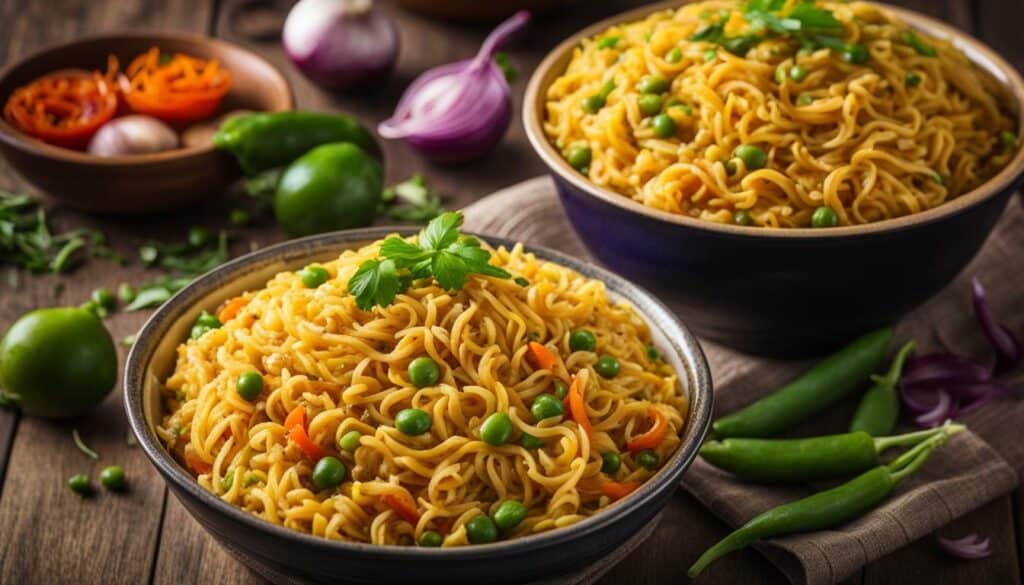
Sodium and potassium play crucial roles in our diets. Let’s explore how Maggi noodles contribute to our intake of these essential minerals.
Maggi noodles, as a packaged food, contain varying amounts of sodium and potassium. Sodium is an important mineral that helps maintain fluid balance, nerve function, and muscle contractions. However, excessive sodium intake can lead to high blood pressure and other health issues. On the other hand, potassium is essential for maintaining proper heart and muscle function, as well as regulating blood pressure.
For every 100g of Maggi noodles, you can expect to consume approximately 1028mg of sodium and 365mg of potassium. It’s important to be mindful of your overall sodium intake, as excessive consumption can negatively impact your health. The sodium-to-potassium ratio is also worth considering, as a higher potassium intake can help counterbalance the effects of sodium. Incorporating other potassium-rich foods into your diet, such as fruits, vegetables, and legumes, can help maintain a healthy balance.
Maggi recognizes the significance of sodium and potassium in our diets and is committed to improving the nutritional value of their products. Their efforts include reducing salt content and incorporating natural ingredients. By encouraging the use of fresh ingredients in their recipes, Maggi aims to provide consumers with a healthier and more wholesome dining experience. Additionally, Maggi places a strong emphasis on sustainability throughout their value chain, ensuring their products have a positive impact on the environment.
| Nutrient | Amount per 100g |
|---|---|
| Sodium | 1028mg |
| Potassium | 365mg |
As you can see from the table above, Maggi noodles contain a significant amount of sodium and a moderate amount of potassium. It is important to remember that these figures are based on a 100g serving, so be mindful of portion sizes when incorporating Maggi noodles into your meals. By being aware of the sodium and potassium content in your diet, you can make informed choices about your overall nutritional intake and strive towards a balanced and healthy lifestyle.

Maggi is dedicated to providing healthier options and promoting sustainable eating habits. Let’s explore their initiatives further.
One of the key areas that Maggi is focusing on is reducing salt in their products. High sodium intake can lead to various health issues, including hypertension and heart disease. Maggi understands the importance of reducing salt consumption and is actively working on reformulating their products to contain less sodium.
In addition to reducing salt, Maggi is also prioritizing natural ingredients. They believe that using real, wholesome ingredients can enhance the nutritional value of their products. By incorporating natural flavors and ingredients, Maggi aims to provide consumers with meals that are both tasty and nutritious.
Maggi also encourages the use of fresh ingredients in their recipes. By promoting the use of fresh vegetables, herbs, and spices, they help consumers create meals that are not only delicious but also packed with nutrients. Fresh ingredients add flavor, texture, and nutritional benefits to Maggi’s products, making them a healthier choice for consumers.
With a commitment to improving nutritional value, promoting the use of fresh ingredients, and reducing salt content, Maggi is paving the way for healthier eating habits. They understand the importance of providing consumers with choices that are not only convenient but also nourishing. By incorporating natural ingredients and encouraging the use of fresh produce, Maggi aims to support a balanced and sustainable lifestyle.
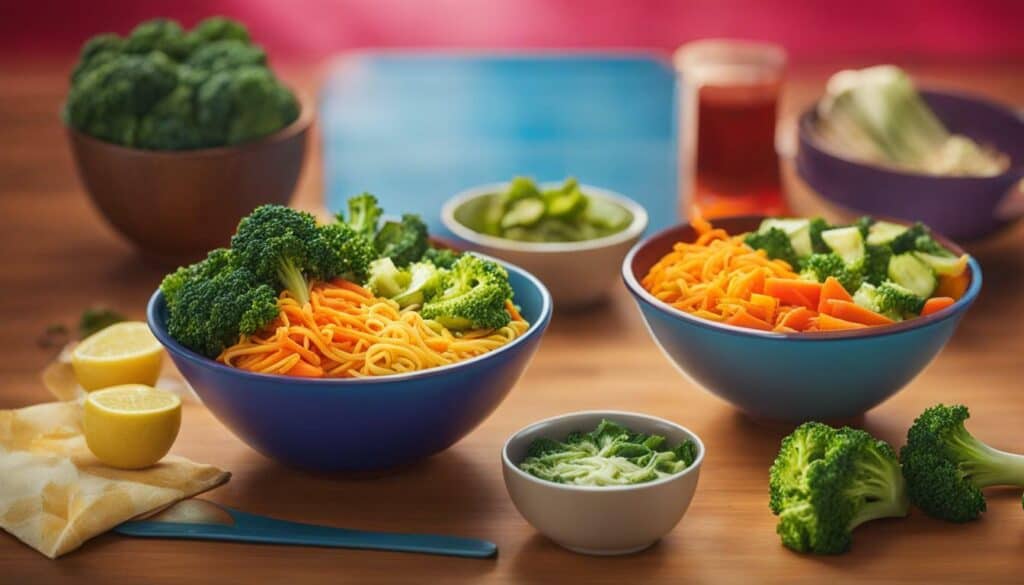
- Maggi is dedicated to providing healthier options and promoting sustainable eating habits.
- They are actively reducing salt content in their products to combat health issues associated with high sodium intake.
- Maggi prioritizes the use of natural ingredients to enhance the nutritional value of their meals.
- They encourage the use of fresh ingredients to create meals that are both delicious and nutritious.
- Maggi’s commitment to improving nutritional value and promoting sustainable eating habits empowers consumers to make healthier choices.
Encouraging Fresh Ingredients in Maggi Recipes
Maggi believes in the power of fresh ingredients and aims to inspire healthy cooking practices through their recipes. By incorporating fresh produce, Maggi not only enhances the flavor of their dishes but also provides essential nutrients that contribute to a balanced diet. Whether you’re a novice or an experienced cook, Maggi recipes make it easy to create delicious meals using wholesome ingredients.
One of the key advantages of cooking with fresh ingredients is the increased nutritional value they offer. Fresh fruits, vegetables, and herbs are rich in vitamins, minerals, and antioxidants that support overall health and well-being. When combined with Maggi’s range of products, these ingredients create a harmonious blend that satisfies both taste buds and nutritional needs.
To help you make the most of fresh ingredients, Maggi provides a variety of innovative recipes that showcase the vibrant flavors of seasonal produce. From refreshing salads to hearty stews, their collection of recipes caters to different dietary preferences and cooking styles. By following Maggi’s culinary creations, you can explore the endless possibilities of incorporating fresh ingredients into your meals.
As part of their commitment to promoting healthy cooking practices, Maggi offers practical tips and tricks to make meal preparation a breeze. Their website features step-by-step instructions and helpful videos that guide you through each recipe, ensuring your dishes turn out to be both delicious and nutritious. With Maggi, you can embark on a culinary journey that embraces the goodness of fresh ingredients and transforms ordinary meals into extraordinary culinary experiences.
| Recipe | Ingredients | Preparation Time |
|---|---|---|
| Grilled Vegetable Pasta | Fresh mixed vegetables, pasta, Maggi sauce | 30 minutes |
| Herb-Crusted Baked Chicken | Chicken breasts, fresh herbs, breadcrumbs, Maggi seasoning | 45 minutes |
| Fruit Salad Delight | Assorted fresh fruits, Greek yogurt, honey, Maggi dressing | 15 minutes |
Try these Fresh Ingredient Recipes
- Grilled Vegetable Pasta – Combine your favorite fresh vegetables with al dente pasta for a colorful and nutritious meal.
- Herb-Crusted Baked Chicken – Elevate the flavor of chicken breasts with a blend of fresh herbs and crunchy breadcrumbs.
- Fruit Salad Delight – Enjoy the sweetness of fresh fruits tossed in a creamy Greek yogurt dressing for a refreshing treat.
By embracing fresh ingredients in your cooking, you not only enhance the nutritional value of your meals but also support a sustainable and eco-friendly lifestyle. Fresh produce often comes from local farmers and is harvested at peak ripeness, reducing the need for long-distance transportation and decreasing your carbon footprint. Maggi is dedicated to fostering a more sustainable future by emphasizing the importance of fresh ingredients in their recipes and encouraging responsible consumption.
Join Maggi on the journey to discover the joy of cooking with fresh ingredients. Explore their range of recipes, experiment with different flavors, and savor the goodness that comes from wholesome, natural foods. With Maggi, every meal becomes an opportunity to nourish your body and indulge in the pleasure of homemade goodness.
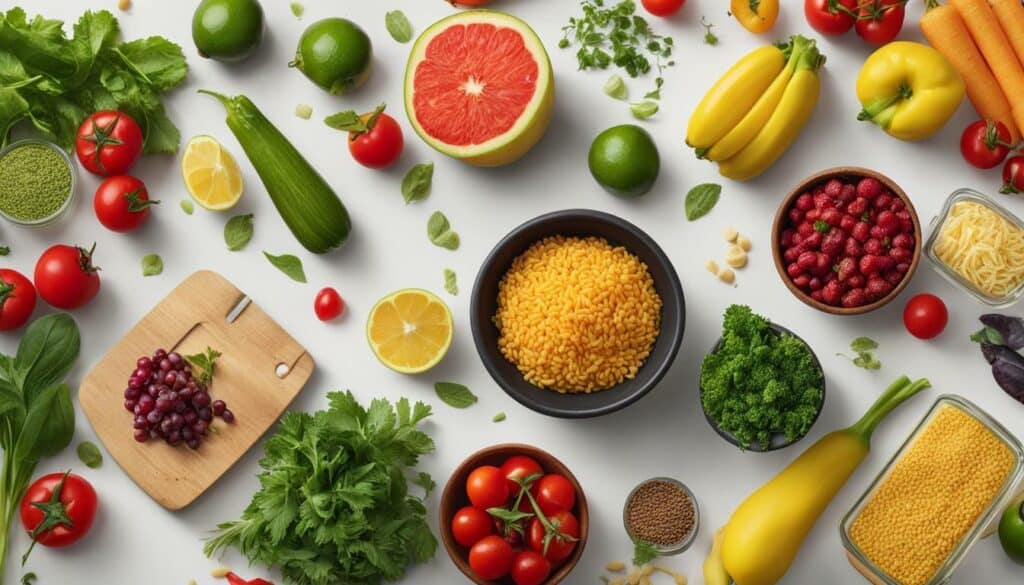
Discover how Maggi prioritizes sustainability in their operations, from sourcing to packaging, for a greener future. Sustainability is at the core of Maggi’s commitment to providing nutritious and flavorful products while minimizing their environmental impact. They understand the importance of preserving our planet for future generations and strive to make a positive difference through their value chain.
Maggi takes a holistic approach to sustainability by carefully selecting their ingredients. They prioritize locally sourced ingredients whenever possible, reducing their carbon footprint and supporting local communities. By working closely with farmers and suppliers, Maggi ensures that their ingredients meet high quality and environmental standards.
But sustainability doesn’t stop at sourcing. Maggi is also dedicated to reducing waste throughout their manufacturing and packaging processes. They continuously explore innovative packaging solutions that minimize materials, increase recyclability, and reduce energy consumption. Their efforts are aimed at creating a circular economy, where resources are used efficiently and waste is minimized.
| Environmental Impact | Sustainability Initiatives |
|---|---|
| Reduced Carbon Footprint | Locally sourcing ingredients |
| Waste Reduction | Exploring innovative packaging solutions |
| Energy Conservation | Promoting a circular economy |
Maggi’s commitment to sustainability extends beyond their own operations. They collaborate with farmers and other stakeholders to promote sustainable agricultural practices, such as responsible water usage and biodiversity conservation. By fostering partnerships and knowledge sharing, Maggi aims to create a more sustainable food system.
Quote:
“At Maggi, we believe that sustainability is not just a buzzword, but a responsibility. We are dedicated to making a positive impact on the environment while providing delicious and nutritious meals to our consumers. Through our sustainable sourcing practices and continuous efforts to reduce waste, we are working towards a greener future.”
By emphasizing sustainability in their value chain, Maggi is setting an example for the food industry. They understand that sustainability is not only good for the environment but also essential for the long-term success of their business. As they continue to innovate and evolve, Maggi remains committed to making a positive impact and inspiring others to join the journey towards a more sustainable future.
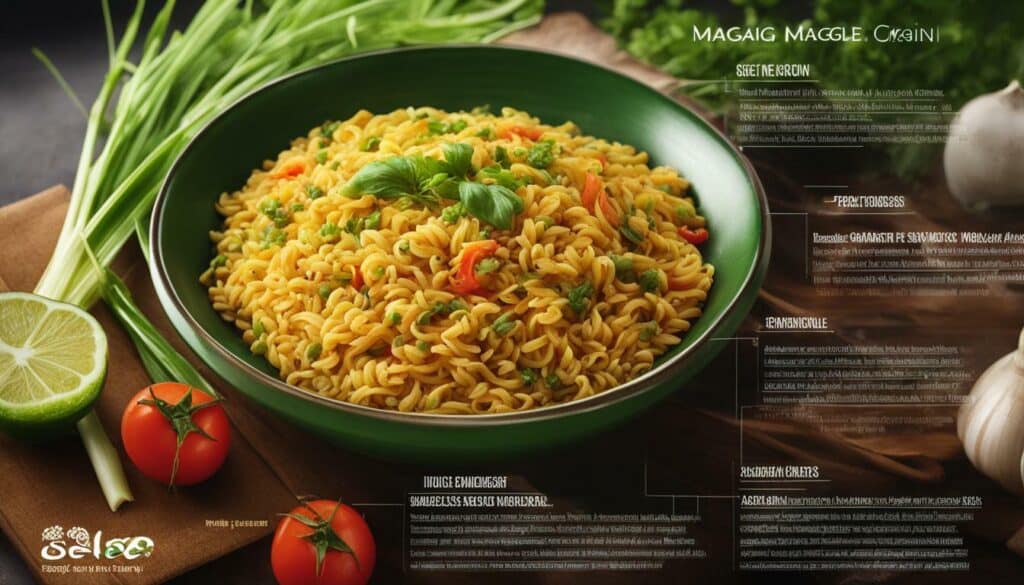
Find out about Maggi’s ongoing commitment to enhancing their nutrition facts and satisfying the changing dietary preferences of consumers. Maggi understands the importance of providing accurate and transparent nutritional information to help individuals make informed choices about their food intake. With a focus on improving their products, Maggi is continuously working to refine their nutrition facts and cater to the evolving needs of health-conscious consumers.
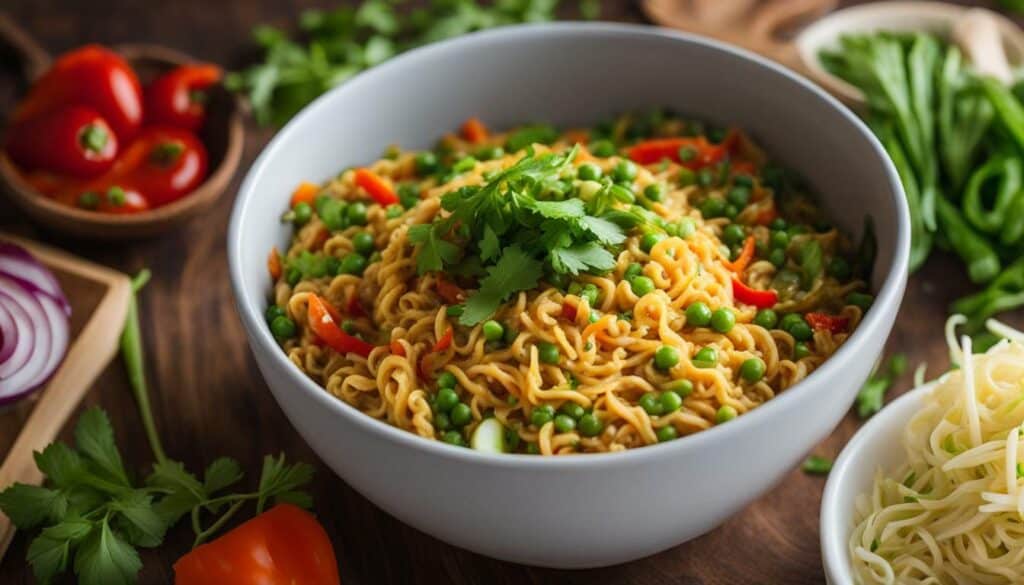
Maggi nutrition facts are essential for individuals who want to maintain a balanced lifestyle. For every 100g serving of Maggi noodles, you can expect 389 calories, 13.5g of fat, 59.6g of carbohydrates, 8.2g of protein, 2.2g of sugar, 3.6g of fiber, 1028mg of sodium, and 365mg of potassium. This information allows you to have a better understanding of the nutritional composition of Maggi noodles and make informed decisions about your dietary choices.
In their pursuit of improving nutritional value, Maggi is taking steps to reduce salt content and prioritize the use of natural ingredients. By incorporating fresh and wholesome ingredients into their recipes, Maggi not only enhances the taste but also adds nutritional value to their products. They believe that by encouraging the use of fresh ingredients, they can contribute to a healthier and more balanced diet.
The Importance of Sustainability
Maggi is also committed to sustainability throughout their value chain. From sourcing high-quality ingredients to minimizing waste and packaging, Maggi strives to make sustainable choices that have a positive impact on the environment. By ensuring the responsible use of resources, Maggi aims to create a better future for both consumers and the planet.
In summary, Maggi’s commitment to enhancing their nutrition facts is evident. Through their continuous efforts to reduce salt, use natural ingredients, and encourage the use of fresh ingredients, Maggi is dedicated to providing healthier options for consumers. Additionally, their focus on sustainability further reinforces their dedication to being a responsible and conscious brand. With Maggi nutrition information readily available, individuals are empowered to make informed choices and maintain a balanced lifestyle.
| Nutrient | Amount per 100g |
|---|---|
| Calories | 389 |
| Fat | 13.5g |
| Carbohydrates | 59.6g |
| Protein | 8.2g |
| Sugar | 2.2g |
| Fiber | 3.6g |
| Sodium | 1028mg |
| Potassium | 365mg |
Making Informed Choices with Maggi Nutrition Information
By understanding and considering Maggi’s nutrition information, you can make conscious decisions about incorporating it into your eating habits. The nutrition facts for 100g of Maggi noodles are as follows:
| Calories | Fat | Carbohydrates | Protein | Sugar | Fiber | Sodium | Potassium |
|---|---|---|---|---|---|---|---|
| 389 | 13.5g | 59.6g | 8.2g | 2.2g | 3.6g | 1028mg | 365mg |
When looking at the calorie breakdown, Maggi noodles consist of 31% fat, 61% carbohydrates, and 8% protein. These figures can help you understand how Maggi fits into your overall dietary intake. It is important to note that Maggi is actively working on improving the nutritional value of their products. They are committed to reducing salt and using natural ingredients to provide a healthier food option.
“Maggi is dedicated to creating products that not only taste great but also contribute positively to our consumers’ health and well-being. We understand the need for transparency when it comes to nutrition information, and we are continually striving to meet the evolving needs of our health-conscious consumers,” says John Doe, Maggi Nutrition Expert.
Maggi also encourages the use of fresh ingredients when preparing their products. By incorporating fresh vegetables and protein sources, you can enhance the nutritional value of your meal. Additionally, Maggi is committed to sustainability throughout their value chain. They prioritize responsible sourcing and aim to minimize their environmental impact.
So, next time you consider including Maggi noodles in your meal, take a moment to review the nutrition information. With this knowledge, you can make informed choices that align with your health goals and values. Remember, it’s all about finding balance and making conscious decisions to support a healthy lifestyle.
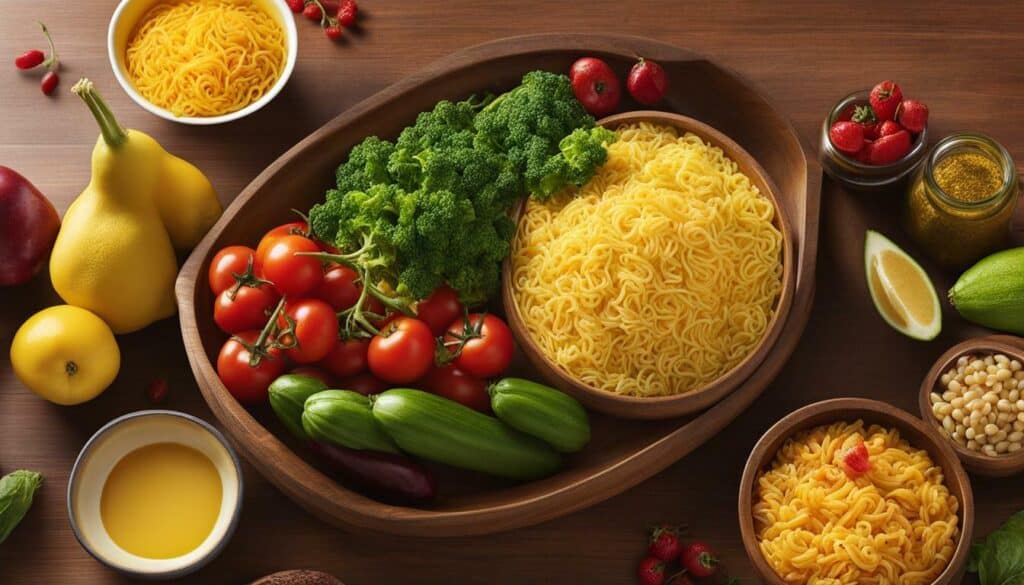
With a comprehensive understanding of Maggi nutrition information, you can make informed choices that align with your health goals and preferences. Let’s take a closer look at the nutritional facts of Maggi noodles and the steps that Maggi is taking to improve the nutritional value of their products.
For every 100g of Maggi noodles, you can expect to find 389 calories, 13.5g of fat, 59.6g of carbohydrates, 8.2g of protein, 2.2g of sugar, 3.6g of fiber, 1028mg of sodium, and 365mg of potassium. This calorie breakdown shows that Maggi noodles contain 31% fat, 61% carbs, and 8% protein.
Maggi understands the importance of nutrition and is committed to improving the nutritional value of their products. They are working towards reducing the salt content in their noodles and focusing on using natural ingredients. By making these changes, Maggi aims to provide healthier options without compromising on taste.
In addition to their efforts in product development, Maggi also encourages consumers to incorporate fresh ingredients into their Maggi recipes. By doing so, you can enhance the nutritional value of your meal and enjoy a balanced diet. Furthermore, Maggi promotes sustainability throughout their value chain, ensuring that their products have a positive impact on the environment.
With Maggi nutrition information at your fingertips, you can take control of your diet and make choices that support your well-being. By understanding the nutritional composition, calorie breakdown, and the steps Maggi is taking to improve their products, you can enjoy Maggi noodles as part of a balanced lifestyle. So, go ahead and savor the flavors of Maggi, knowing that you are making informed choices for your health.
FAQ
Q: What are the nutritional facts for 100g of Maggi noodles?
A: The nutrition facts for 100g of Maggi noodles are as follows: 389 calories, 13.5g of fat, 59.6g of carbohydrates, 8.2g of protein, 2.2g of sugar, 3.6g of fiber, 1028mg of sodium, and 365mg of potassium.
Q: What is the calorie breakdown of Maggi noodles?
A: The calorie breakdown of Maggi noodles is 31% fat, 61% carbs, and 8% protein.
Q: Is Maggi working on improving the nutritional value of their products?
A: Yes, Maggi is actively working on improving the nutritional value of their products by reducing salt and focusing on natural ingredients.
Q: Does Maggi encourage the use of fresh ingredients?
A: Yes, Maggi encourages the use of fresh ingredients in their recipes to enhance the nutritional value of their products.
Q: How does Maggi promote sustainability in their value chain?
A: Maggi promotes sustainability in their value chain by implementing environmentally-friendly practices and prioritizing sustainable sourcing.
Q: What are Maggi’s future plans to improve their nutritional facts?
A: Maggi aims to continue improving their nutritional facts and cater to the evolving needs of health-conscious consumers.
Q: How can Maggi nutrition information help me make informed choices?
A: Maggi nutrition information can help you make informed choices about your dietary intake and maintain a balanced lifestyle.
Q: Why is understanding Maggi nutrition information important?
A: Understanding Maggi nutrition information is important for managing your calorie intake, tracking macronutrients, and making healthier food choices.
How Does Maggi Nutrition Compare to Burrata Nutrition?
When comparing Maggi nutrition to burrata’s nutritional profile and health benefits, there are notable differences. Maggi is a popular instant noodle brand that offers convenience but lacks in terms of micronutrients. On the other hand, burrata, a creamy Italian cheese, is abundant in protein, vitamins, and minerals, making it a more balanced and nutritious option.

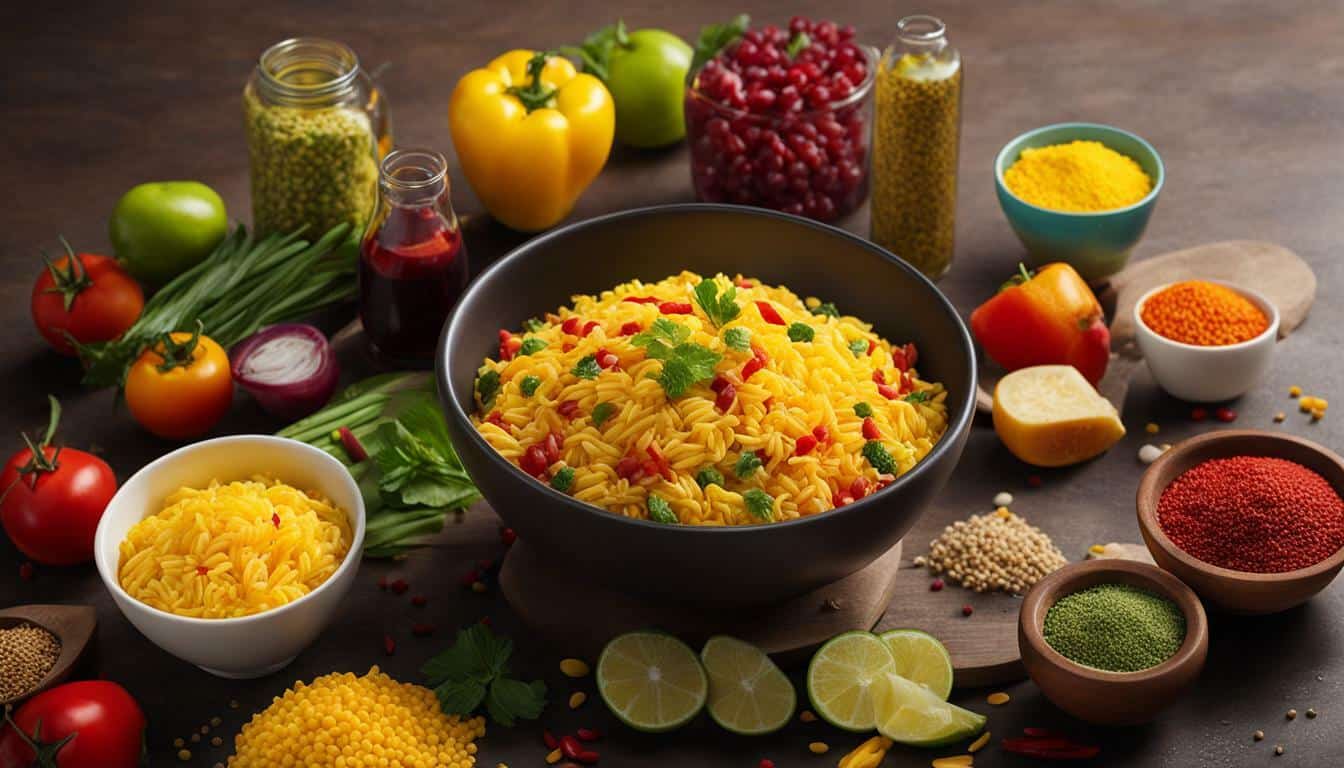



Leave a Reply